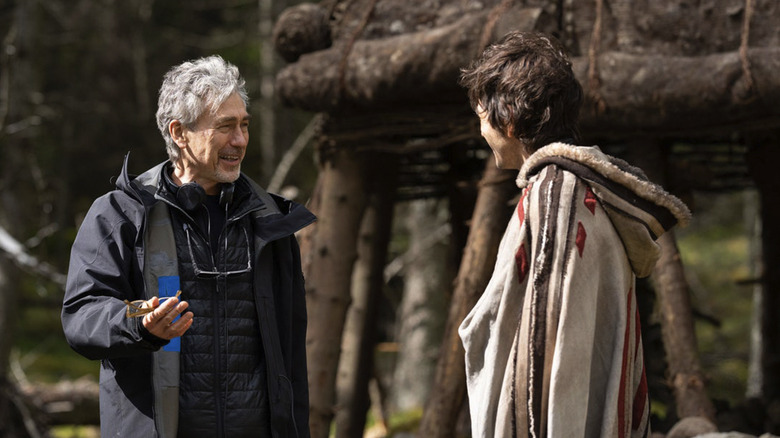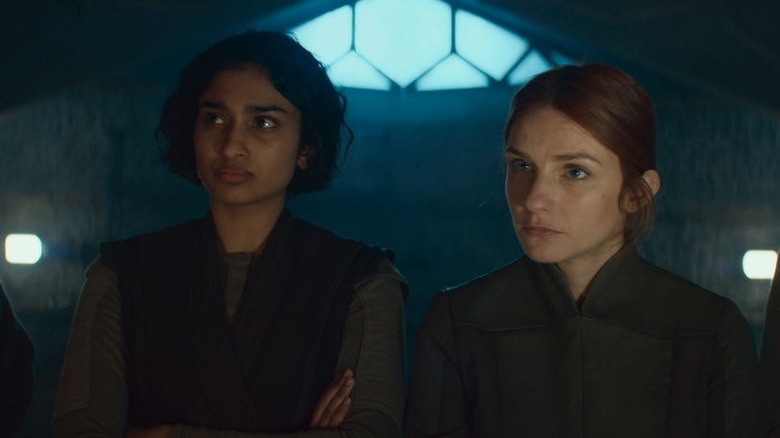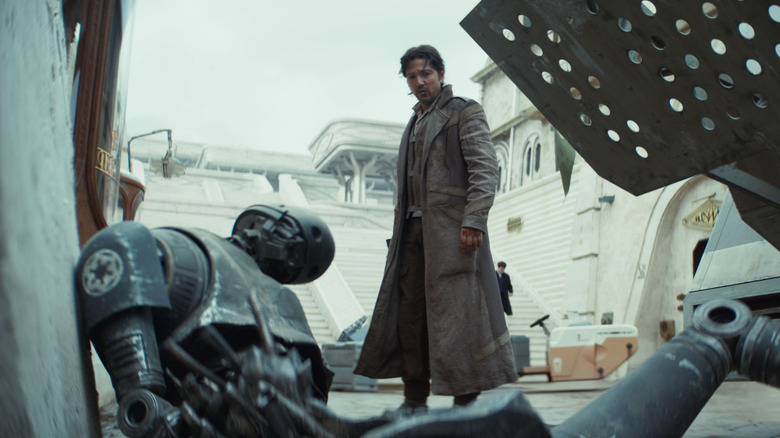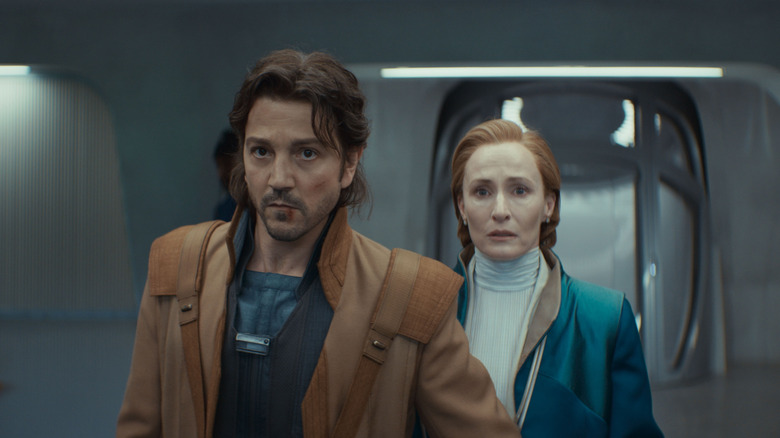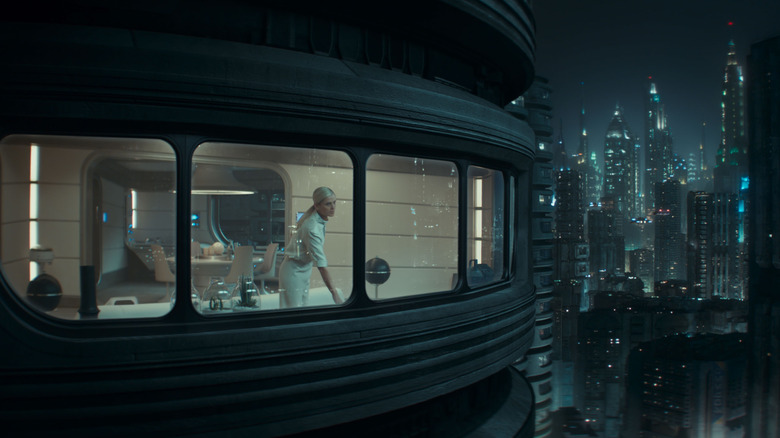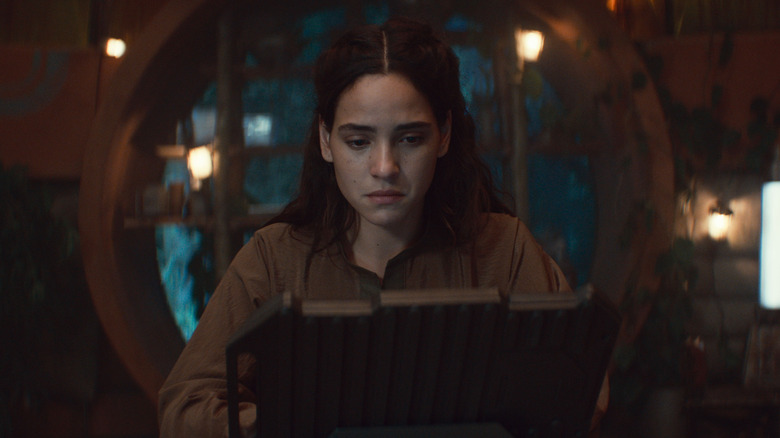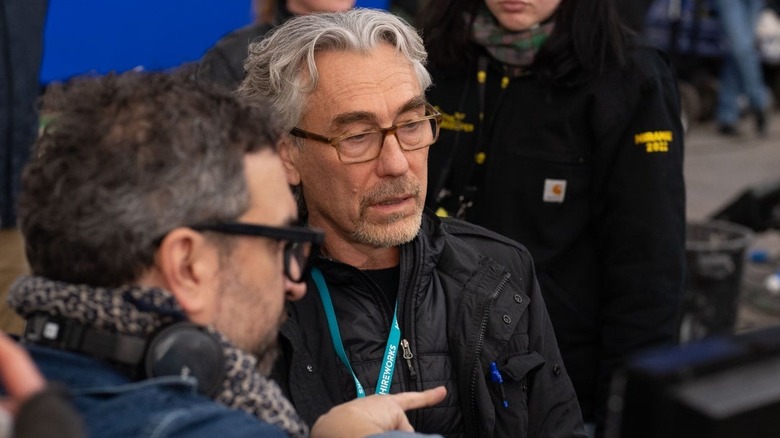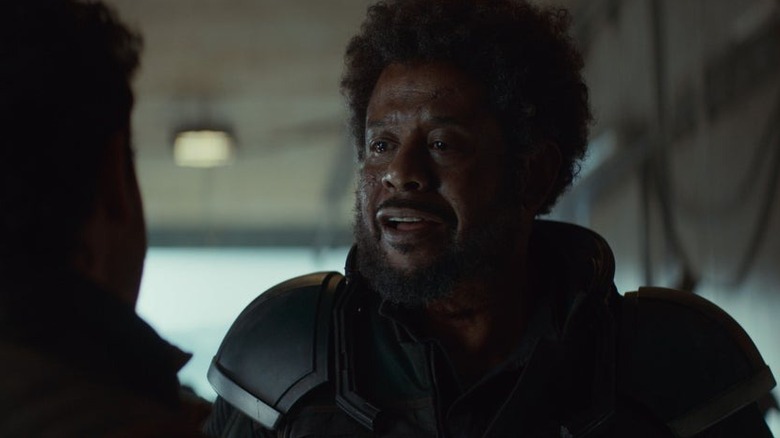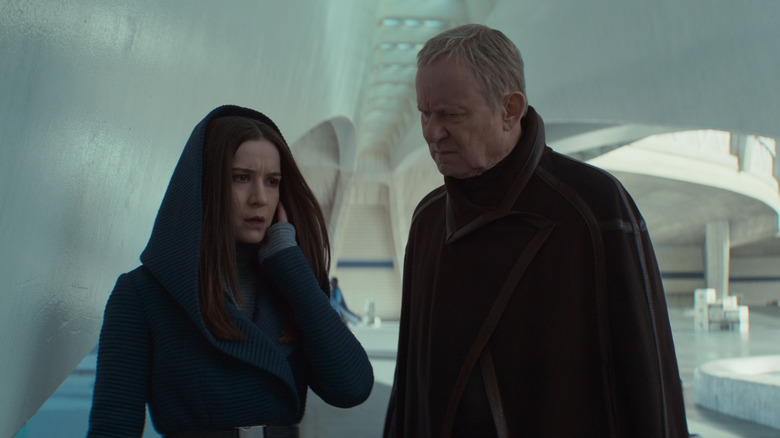Andor Showrunner Tony Gilroy Addresses The Series' Most Controversial Storyline [Exclusive Interview]
This post contains spoilers for all of "Andor" season 2.
"Andor" is now officially over, and while we've said it before, it's truly incredible that this series made it to the screen with this level of consistent quality throughout. "I can't begin to get my head around all the things that we had to make up in five years," creator and showrunner Tony Gilroy told me in a recent conversation. "The amount of imaginative engineering that went into the last five years, the amount of ideas is, looking back, it's like having 25 children or something."
If Gilroy sounds especially proud of his crew for helping to realize this astounding vision, that's because he is. Every film and TV show requires the time, energy, and sacrifices of its crew, and when the end result is as spectacular as "Andor," it's worth taking a moment to celebrate. As you'll read momentarily, there's plenty of celebration in my discussion with the showrunner, but I also wanted to ask about one of the most controversial aspects of the series' second season: Gilroy's decision to kill Cinta (Varada Sethu), one half of a queer couple who had experienced a troubled journey over the course of this show. Some viewers didn't react well to that decision, and I wanted to know how Gilroy was feeling about that response. So while there is lots of terrific stuff in this conversation — he talks about working within the confines of existing storylines, shares his thoughts on Marvel movies, reveals a promise he made to Stellan Skarsgård about Luthen Rael's backstory, and much more — it kicks off with a bit of an apology.
Note: This interview has been lightly edited for clarity and brevity.
Tony Gilroy addresses the controversial decision to kill Cinta in Andor season 2
Before we get into it, Tony, I just wanted to say that for me, this show has been the most exciting and interesting thing in the Star Wars universe for years, so thank you very much for giving us something so thoughtful and thematically rich. I really appreciate it.
Tony Gilroy: Let's end [the interview] right there. [laughs]
I only have one potentially contentious question for you, so I might as well just dive in and start with that. I'm not sure how closely you've paid attention to the reaction to the show this season, but the Vel/Cinta storyline was a big discussion point on social media. I was just wondering if it bummed you out at all that some viewers are disappointed about that storyline falling into that trope of queer characters being killed on screen.
People say that that's a trope. I don't know what the provenance of it is. I think if you're going to get credit for treating the relationship as any other relationship, then how can you get punished for treating the relationship like any other relationship? [That's] my attitude. I'm treating everybody the same. I'm an equal opportunity ... [trails off]. So I find it a little bit odd. I never thought that was a thing, but if it's a thing, I'm sorry, but I'm not sure I would have done anything differently. No, I'm treating them as if they're like everybody else.
Yeah, I think that's the counter to it. I think there's a lot of complicated feelings of people being on both sides and feeling torn.
Yeah, wow. It was a bit surprising, that, but I don't know — what's the right answer? Yeah. You're either being exceptional for one thing or exceptional for something else. I don't know.
Tony Gilroy has a theory about why Marvel movies fail
I know that you originally planned or thought about doing this as a five season show. I was wondering how far down the line you actually got in terms of mapping out your original vision. Can you pinpoint which parts of that planned storyline would have been in season two and so on, or did it not really even get that far?
The same trajectory has to happen. I think in the very beginning, I think I have my original files before we even started season 1, before we went to the writers' room in the very beginning. I think I, pre-Covid, had a, "Oh my God, this is what season 1 is." In my urge to organize and stop panicking, I did that. So I'm sure there's an incredible amount of stuff in there that was extraneous and stupid and has nothing to do with what we're doing, but essentially, a lot of the story, the structure of the story is basically mapped out. If you're going to have to go to Ghorman and you're going to have to get to "Rogue [One]" and you know the rebellion's going to have to come together at Yavin at some point, you kinda know — you have a calendar.
Yeah. Do you remember if there was anything in those earliest drafts that you didn't get a chance to do in the show because it just didn't really make sense and you guys went in a different direction?
There were all kinds of things that happened along the way. Things that we actually did that — I mean, Aldhani was supposed to be a huge, gigantic festival with 10,000 people. Covid killed that. Dan Gilroy wrote a huge standalone episode for K-2 that was supposed to be episode 9. We couldn't afford to do that, so we rejiggered stuff like that. There's all kinds of things all along the way like that. Yeah, that's a constant adjustment. Yeah.
I understand that Lucasfilm's original conception for this show would have been about Cassian and K-2SO roaming around and going on adventures and things like that. People who have seen the entirety of this season will know that you did eventually include K-2 into this show, but you waited a while before you did that. I was just wondering if the inclusion of that character felt like a narrative burden for you in any way.
No. In the show, it's perfect. That's something I always intended. The versions that they had of the show prior, they were slick and they were interesting. They were not bad, but they had a fatal flaw, it seemed to me, which is if that's your show, that we're going to storm the Citadel in the pilot, what are you going to do in episode 9? What do you do? You're just going to keep getting the disc? Trying to get the, what do they call it? I can't remember the name of the box. What the f*** is the name of the box in "The Avengers?" What the f*** are they going for?
Oh, the Tesseract?
The Tesseract! That's why all those Marvel movies are all — that's why they fail. You're just constantly ... if that's all you're doing, then all you're doing is just trying to get the Tesseract. If you look at "Rogue," you look at how many times just in "Rogue" we had to hide K-2. How many times in "Rogue," he says, "Oh, I'll stay in the truck while you guys..." or Cassian tells him, "You've got to stay in the truck until we come back." It happens three or four times, just even in "Rogue." You can't hide him. You can't disguise him. He's a really, really big piece of equipment to carry around, but fantastic. When you want him, you want him, but I just was like, "I don't think you can do it, and I want to do it late."
Andor season 2 tells the true story behind an event also depicted in Star Wars Rebels
I have not seen the animated "Star Wars Rebels" TV show myself, but my coworkers tell me that that show alluded to the Ghorman massacre, and there's an episode where Mon Mothma escapes Coruscant after calling out Palpatine for genocide. I know that you've said a bunch on this press tour that you've had a ton of freedom to make "Andor" as an overall experience, but I was wondering what the experience was like for you of dealing with canonical events like that which have to happen a certain way on that Star Wars timeline.
There's a whole variety of what's canonical and what's not canonical, but that show is canonical. That's an above the line one that we have to pay attention to. I have to admit that when we looked at it, we were like, [hesitant] "Whoa." Well, what do we get out of it? We have to introduce a character, her assistant, Erskin Semaj, so he goes into the wedding. We start with him at the wedding. Later on, you'll find out that's when Luthen recruited him. His mother was Ghorman, and that's a little breadcrumb that anybody who's really paying attention will pick up on. So we build Erskin Semaj. There's got to be another term other than retcon, because we're not going to really retcon it, but we're going to tell you that — it's like, print the legend, not the truth. We're going to show you the true thing that happened. Everything in the cartoon should still be legit, it's just the backstory is not what happened, so that was our answer for that.
That's great.
What do they think? Do they think that it was consistent?
I think so. I've just talked to people who love both shows, so nobody has been complaining about how "Andor" treats it, so I think you did a good job there.
The thing is, when [Cassian] gets off the truck at Yavin at the end, and then Draven says to him, "Hey, thanks for doing this" and whatever, and "she's going to give this big speech and it's better if the Gold Squadron — she's going to give a big speech if you want to hear it." And Diego says, "No, man, I already heard her speak," [laughs] and he heads off. He heads home.
On a similar note, sometimes writers talk about how they appreciate guardrails being put up around them so they can find creative ways to color inside the lines. How did you feel about that idea? Because, as you alluded to earlier, this show narrows in on the storytelling possibilities as it gets closer to the end and you basically have to put the pieces where they're going to be at the start of "Rogue One" by the end of the show.
It's a godsend. It's absolutely, I mean, I can't begin to get my head around all the things that we had to make up in five years. The amount of imaginative engineering that went into the last five years, the amount of ideas is, looking back, it's like having 25 children or something. You can't remember them. You are desperate for anything that [gives you] points on the board that you can count on. Limitations are like, "Okay, that's taken care of. Okay, I've got to finish here." My God, if it was just open-ended, you'd totally freak out. There's enough time to freak out within the boundaries. [laughs]
How Tony Gilroy and his Andor colleagues avoided getting overwhelmed by the size of their own storytelling
I did want to ask a couple of questions that my colleagues wanted me to ask you. This is a super nerdy one, but given all of the work that you guys did to build out this show and how much thought you put into every aspect of this, I was wondering if this crossed your mind at all: Did you ever get any pushback about giving a TIE fighter lightspeed capabilities, or consider why the Empire never implemented anything like that in the future of TIE fighter designs?
No. That's not my department, really. That would be, [visual effects supervisor] Mohen Leo and [visual effects producer] TJ [Falls] and ILM and all those guys pretty much did that whole sequence. I get them to the ship and say, "Oh my God, he hits forward and it goes backwards. He doesn't know how to fly it." Then they did everything else. We saw millions of pre-vizes and critiqued it all the way through and it's shaped down or whatever, but they designed the ship. They know all the provenance of everything that happens there. So I don't know. I'm not the right person to answer that question.
Okay. You were talking about looking at pre-vizes. What was that like for you, for a show that's this expansive, that goes to so many different places throughout the galaxy, with how many different options people must have presented to you for how different things could have looked — how did you not get overwhelmed with all of the options you must have had there? Was there anything that jumped out at you as being maybe a fork in the road moment or something that could have maybe changed how things look?
Look, it's like anything, man. It's really, really like any kind of project. You just literally have to go teaspoon by teaspoon. Every now and then, you can pull out and say, "Hey, wait, on a macro level, what am I doing? Is this okay? Am I getting in the weeds?" You have to just go stitch by stitch by stitch. Luke Hull and I, long before anybody else gets involved, Luke and I are figuring out, "Oh my God, I need to do Ghorman. Okay, if we're going to do Ghorman, what's it going to be? What's it look like? What's the economy? What's the language? How big are we going to be? How big a spend is it going to be? Oh my God, if it's going to be that big a spend, it better go over two blocks. Holy s***, it can be a convergence of the other part of the story. Oh my God, now we need to do spiders. How are we going to do that?"
If you ever look down, you panic. You have to fight your panic all the time by being very specific every day. You really have to have your management skills together. I would say that pretty much almost every day on the show, I had to use absolutely everything I have ever learned in my life about how to do it, whether I'm writing memos or making decisions. One of the things is, I'm absolutely willing to change my mind. You have to be willing to change your mind, but I make decisions really quickly. You've got to really make a lot of decisions really quickly. If you f*** up, you've got to be willing to ... but you've got to make decisions quickly. You've got to stick with them. You've got to share information with people all the time, and you've just got to move step by step by step. Otherwise, you drown. You really get underneath the wave.
In "Andor" season 2, we get a look at what television looks like in the Star Wars universe. Was there a specific inspiration for the glimpse of what that looks like, if there's some kind of daytime –
They had done it before. They had done it before. I know that on "Rogue," at one point, I was proposing doing a race, like a gambling race. They had a video of these birds, so I know it exists. We just asked, within that, what does it look like and what would it be like? What's the machine that comes in like? It's sort of like a Minitel, I remember what Minitel used to look like. Then it was like, "Why wouldn't they have 'Good Day Coruscant?' Why wouldn't they? Let's do that. Let's have that."
That's fun.
Tony Gilroy has a new movie he wants to make, and Oscar Isaac is on board to star
I want to make sure to ask you about the final shot of this entire series, of Bix standing in that wheat field with her and Cassian's kid in her arms. Can you tell me what you liked about wrapping up this story with that particular image?
I mean, I had to end on something hopeful. I knew I did. It's just such a very tough show on the characters. A lot of it's really heavy, and you know where you're going in "Rogue" is pretty dark, so it would be, not just a crime against storytelling, but just in my own spirit. I really have to finish with something uplifting. There really has to be hope. Otherwise, what are we doing?
I know this whole experience from "Rogue One" all the way through to "Andor" has taken up nearly a decade of your life. After all that, do you have any more interest in telling additional stories in the Star Wars universe? I know James Cameron has said something like, "Maybe I can just make 'Avatar' movies until I die because that canvas is so expansive and I can tell any story that I want within that universe." Do you have any similar thoughts about Star Wars, or are you ready to move on to something else?
I've got a movie I'm trying to make. A completely different thing. No, I wouldn't want to — I've learned to never say never, but it's hard to see what that would be. No, I have other things I'd like to do.
We're huge fans of your movie work at /Film as well. Can you tell me anything about the movie project you're thinking about?
I want to make a movie about movie music, about scoring and musicians, and the scoring musicians. It's about a cellist. Oscar Isaac is going to play the cellist. It's a cellist who comes back to L.A. from a very heavy studio, third-generation music family. He comes back to L.A. for a few months to do sessions on movies. It's all about — it's why he came back and why he went away, and whatever.
Man, that sounds awesome. I'm so excited about that. Okay, so has the size of the canvas that you had to work with on this show, in terms of the amount of time that you had to write the story, has that novelistic level of freedom in some ways ruined you for returning to the world of movies? "Andor" is so much bigger than anything that you had ever done in your film career. Are you able to switch back into movie mode easily, or has "Andor" just been such a dominant experience in your life that now it's opened you up?
I was into it and man, I'm really happy I did it, but it made me a better writer. I became a much, much, much better writer on the show for other reasons. Because A) the actors are so good, and you're seeing everything that you're writing come off your desk go right into the thing. I'm working with Danny and Beau and Tom. I get the benefit of that. I just became a much, much better writer. No, I've already proven to myself — it was really nice to go back and write a movie. I wrote very quickly. I was in really good shape and wrote much more sharply than I probably would've done it five years ago. But no, I'm really into doing a movie now.
Andor's department heads did extraordinary work
You shouted out Luke Hull earlier, and his work on the show has just been tremendous. I've noticed that, on this press tour, you've done that a lot: shouted out a lot of your different collaborators and contemporaries and people you've worked with. Is there any aspect of the show that maybe you haven't been asked about a lot that you think deserves some praise that it might not be like the sexiest component of the show, but you've really appreciated?
People who don't get enough [kudos]? Mark Maley, who was our stunt coordinator on both seasons and also built all these stunts, built all these fights, built all the action. Mark really doesn't get enough shout out. Really creative. And like Mohen Leo, who's the visual effects supervisor, they both instantly seemed to grasp on what the grammar was and what the aesthetic was and what my taste was, and the level of naturalism that we want. Very little discussion about like, "Oh my God, that's way too far. That's way too extravagant." Or "We would never do that. Keep it real." Almost never had to say that. Emma Scott, who did the hair and makeup on this show. Oh, my God, man, look at all the people in the whole department. Michael Wilkinson is getting a lot more kudos now and people are paying attention to all these costumes. Again, it's just monumental.
Nina Gold and Martin Ware, who cast the show. 400 speaking parts. 400 speaking parts. All these actors, they all come through that office. For every actor who's cast, you've seen five, six other actors at least. The ADs on the show, the ADs who, Sean Gaston on the Ghorman massacre, wrangling those extras for a month? Keeping everybody — they're so into it. They're so energized. They're so part of it. They're so much a community.
There are so many people like that. We try to make every single person on the show who has any ... God, I could just go on. The props department. I mean, Johnny and I walking up to the props department to go look at that rhydonium hijack pump that they built. We're like, "Holy s***, this is 20 times more complicated and wonderful than we ever needed, but yeah, let's have that." It's up and down the line, man. Everybody's a filmmaker on the show. There's too many people to mention.
It's an astounding achievement.
The story behind Saw Gerrera's incredible Andor season 2 speech
I'm also glad you mentioned the rhydonium. Having Forest Whitaker as a piece that you can operate with on this chessboard must've been a big benefit to you. And that speech, man, where he's talking about the rhydonium and his history and being out in the jungle was just ... I knew the show was amazing, but I feel like that took it to a whole other level. Was it Beau Willimon who wrote that episode?
We were going to do the thing with Saw, because we wanted to have Wilmon — we wanted to see what Luthen kept doing now that he's losing Cassian. He's got Wilmon as his new surrogate, so he's sending Wilmon out to be his emissary. "We'll send Wilmon to Saw. We'll feed him to Saw." Then I was like, "Man, should he be hucking that thing that he has in 'Rogue?' When did he lose his leg, and when did he start that s***, and what is that s***?" Because we never really knew. Is it oxygen, or what is it?
Then we said, "He should be sending him there to steal this jet fuel," because Saw's crew is all flying all over the place, so jet fuel is a really big deal for him. "My God, this gives him an opportunity to get jet fuel anywhere he wants. He can steal it for the whole — he's got this magic tool." I remember Beau calling me up and he goes, "What if it's the rhydonium that he's hucking?" I'm like, "Oh my God." He goes, "What if that's the thing that's...?" I go, "Holy s***, let's go with that." I was like, "Yeah, f***ing really cool."
Yeah, that's such a cool scene.
Stellan Skarsgård had one request about Luthen's backstory
I know you've spoken a lot about your love of history and diving into history over the years. You've been reading a lot about revolutions for decades and were able to incorporate some of that into this show. Luthen is one of my favorite characters, and I would just love to know if he's based on any real historical figure and what you wanted his journey to be like over the course of the second season.
He's not modeled after any specific person, but every rebellion and revolution has all kinds of people that — think of the material you need. You need someone who's acquiring. I mean, Ben Franklin goes to France and he's getting weapons and money and connecting people, and, "You should meet so-and-so and so-and-so and so-and-so." Who are the people that are connecting people? He is representing a specific philosophy of extreme revolutionaries — Mao included, and some others. He's an accelerationist, is what it's called. That's the term of art. [Their goal is to] make things as bad as they can possibly get so that people rise up. A really punishing, burn the field down and we'll starve our own people so that they revolt.
In terms of where he was going to go in the show, I promised Stellan, even in the five-season version, that if he wanted to die after two seasons, I'd kill him. I knew that I wanted him to have a shelf life emotionally as well, because season 1 is this guy who built this s*** in his garage and he's trying to go public with it and trying to take it out. His human resources skills are not his strong suit, and it's really hard to be secret and loud at the same time, and it's going to get out of his control. He's not going to play well with others. And that's interesting and true. Most revolutions have all kinds of people. That's why I do the first scene on Yavin with the idiots. I want to really lay a lighter version of what's going to happen later on in the show, which is like, "This s***'s a mess."
Yeah. And tell me a little bit about increasing Kleya's opportunities in this season as she and Luthen — it seems like they're butting heads more this season as he becomes more frazzled. You can tell that he's spinning out a little bit as the season goes on.
I think you find out by the time you get to the end of episode 10 who's really been in charge the whole time. She's really been in charge from day one. From the moment he opened that cage in that ship, she's been in control, I think. I think he's been afraid of her from the very beginning, in a way, or he's been paying off to her in a way. I think it's a classic marriage, it's a classic father/daughter, it's a classic partnership. And he is f***ing up, he is getting frazzled, and he is getting emotional. And she messes up, too! She makes a mistake, putting that bugging device in. Their arguments are legit small business arguments. [laughs]
Was that reveal something you came to late in the writing process, or was that the plan from the beginning?
No, I think in the very beginning, before we started even doing the show, I think when Stellan was first coming on and wanting to know what my plan was, I know I had some elaborate backstories for him. And they were too complicated. He said, "Let's not fixate on it now." He said, "Just promise me one thing: That it won't be revenge." He didn't want it to be revenge as his motivation. So this is about as far from revenge as you can get.
Both seasons of "Andor" are streaming now on Disney+.
